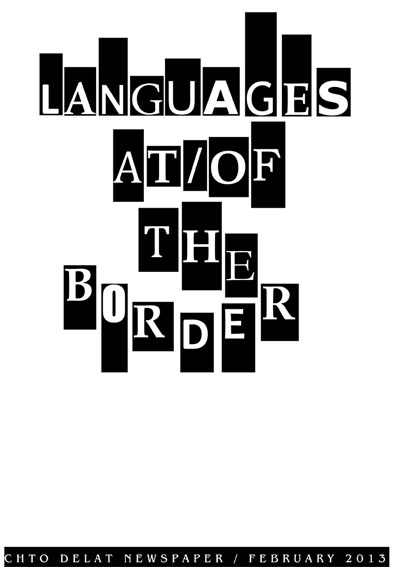The idea for this issue arose when we begin working on our film A Border Musical, whose screenplay is also printed here. This film is based on a study of the situation on both sides of the Russian-Norwegian border: we were interested in how a range of differences, which inevitably serve as sources of conflict in border areas, shape the subjectivity of people in daily contact with each other.
Borderlands always aggravate differences – political and social, behavioral, linguistic and economic, and so on. The border’s physicality, particularly in the form of rigid paramilitary zones impeding the free circulation of people, causes anyone who becomes caught up in their force fields to re-examine the world and themselves. On the map of the world, such areas have always been not only the focus of geopolitical tensions, but also special habitats encouraging the development of new forms of language, behavior and culture. The border is a place for experiment, a zone of mobility and change.
The history of state borders has always been a history of violence: a history of wars, militarization, securitization, bureaucratic control, biopolitical regulation, forced displacement, flight and migration. Historically, state borders are shaped by the balance of violence. The winners dictate them to the losers, without taking into account either real geography or ethnicity. Borders separate “us” from “them,” and these divisions are set down in documents determining state loyalties and citizenship. Paradoxically, borders, which are always artificial forms, are an essential factor of existence, shaping not only the lives of people, but also impacting the natural environment and the animal world.
Familiar to anyone who has ever participated in European protests, the slogan “No borders, no nations. . .” (which can be continued in various ways as tactics demand) is a radical utopian response to the current delineation of the modern world. It says that one and the same common extraterritorial border runs everywhere – the boundary separating the world of prosperity from the world of poverty. This border runs both along the real boundaries of the so-called First World (e.g., Fortress Europe) as well as within it, generating ever-new ghettos and zones of exclusion. The fall of the Berlin Wall was a celebration of the hope that the Cold War’s division of the world was over, and the whole planet would be a single home for everyone, with people united by a common, global citizenship. It was a foretaste of the performative unity of the world described by Alain Badiou in his text “The Communist Hypothesis,” which we have excerpted in this issue.
More than two decades have passed since then, and we see this beautiful utopia has turned into its opposite: borders and walls have multiplied, inequality has grown, and the freedom of globalization has given way to the total freedom of global financial speculation and the establishment of new forms of market colonization and imperialism. It is not worth indulging in pessimism, however; the true dialectician always strives at history’s most depressing moments to identify those potentials that emerge despite everything (or are concealed on the flip side of all reactionary processes) and work on implementing the prerequisites for alter-globalism. It was this movement for as-yet-untested grassroots forms of globalization that, despite its current downturn, was able to outline a range of ideas and initiate a series of political processes that are still alive and evolving.
Constantly keeping in mind the sociopolitical problems of the modern border, in this issue we have decided to focus primarily on an analysis of linguistic differences and show that, in the fight for a new unified world, it is also important to take into account the structural features of human consciousness, its intrinsic limitations. And here our understanding of the dialectics of subjectivity is formed not only in the search for unity, but also by the insurmountable limitations imposed by one’s body, one’s language and one’s finitude.
It is in this context that crossing the border is problematized not as a universal right to equality and a decent life, but as the fundamental human desire for another, unknown experience, the desire for an encounter which conceals the potential for love and the possibility of death, the possibility of arriving at a place where everything would be different. The experience of the border as an experience of sublime knowledge of the world is how Johan Schimanski describes this state of being in his text for this issue.
The desire for a harmonious existence with oneself, with others and with the world, in which all barriers and borders would be removed, is a vital trait of human beings as a species. Existing boundaries constantly remind us of how far we are from that lofty ideal. At the same time, it is their everyday oppressive presence within and around us that stimulates our search and our thirst for transformation. As the song has it, “If you press with your shoulder, / And you and I push together, / The walls will crumble, crumble, crumble, / And we will breathe freely.”
Dmitry Vilensky










